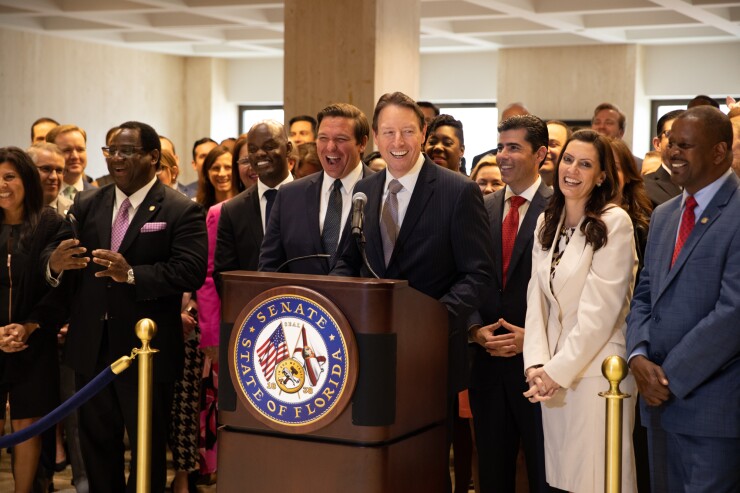Florida lawmakers have approved a $91.1 billion budget for fiscal 2020 as well as the state’s first major new bond-financed road program in recent years.
The Legislature agreed to the spending plan on Saturday, their last act before the 61-day session ended. The Senate voted 38 to 0 for the measure, while the House voted 106 to 2.

The budget takes effect July 1 and is $2.4 billion more than the current year’s appropriations.
It will mark the ninth consecutive year of record spending by the Sunshine state if approved by Gov. Ron DeSantis, who has line item veto authority.
DeSantis, a Republican who took office Jan. 8, got much of what he sought in his first budget even though he recommended spending $91.3 million. The final bill included millions more in funding for environmental programs than DeSantis’ predecessor, Rick Scott, who is now a U.S. senator.
“This session marks the beginning of a new day in Florida,” DeSantis said. “From our environment, to education, to public safety and healthcare, we have put people above politics and made a commitment to our future generations that we will leave our state better than we found it.”
DeSantis also requested that lawmakers authorize $792.8 million of bonds for road and bridge projects, but the final budget language and bond authorization hadn’t been prepared as of Monday.
The Republican dominated Legislature agreed to put $625 million in the budget to pay for Everglades restoration and to protect other water resources, which DeSantis said puts the state on track to spend what he’d proposed — $2.5 billion over the four years of his first term in office.
While DeSantis touted increased funding for K-12 education, he also supported several programs that lawmakers passed directing increased scholarship funds, budget revenues and capital outlay funding to religious schools and charter schools, which are privately operated nonprofit public schools.
Sen. Audrey Gibson from Jacksonville, the chamber’s Democratic leader, said some of the school legislation probably would be challenged in court because it siphons “public money from traditional public schools.”
Senate President Bill Galvano, R-Bradenton, said the Legislature advanced a number of “key public policy enhancements and funding investments” that respond to feedback from constituents.
Those investments, he said, include $1.85 billion for relief and recovery in the Florida panhandle, which was decimated by Hurricane Michael in October 2018. The funding will go toward building affordable housing, repairing critical county and municipal roads, and rebuilding education facilities.
Galvano himself was a winner this session getting lawmakers to support his major toll road initiative through three rural Florida areas. The measure, Senate Bill 7068, was approved by the Senate on a vote of 37 to 1 and by the House, 76 to 36.
The legislation, dubbed the Multi-use Corridors of Regional Economic Significance Program or M-CORES, directs the Florida Department of Transportation to create three task forces to analyze the toll road corridors, including the environmental and land use impacts. No development studies have been done so far.
While each task force must produce a written report by Oct. 1, 2020, the bill says “to the maximum extent feasible, construction of the projects must begin no later than Dec. 31, 2022.” The total cost of each project is unknown.
Galvano’s legislation redirects general revenue funds and motor vehicle license tax fees to the state transportation trust fund to provide the toll roads with $12.5 million in fiscal 2020; $57.5 million in 2021; $101.7 million in 2022; and $105.9 million in 2023.
The projects can be financed with bonds issued by various agencies, including turnpike revenue bonds, right of way and bridge construction bonds, the FDOT Financing Corp. The bill also says public-private partnerships can be used.
Galvano said Saturday that the M-CORES program would strategically plan for future population growth while revitalizing rural communities and providing new job creation.
“The benefits of this type of long-term investment in our infrastructure include regional connectivity that enhances trade and tourism, congestion mitigation and evacuation routes, as well as broadband, water, and sewer connectivity that helps preserve our natural resources while improving quality of life for residents in rural areas of our state,” Galvano said.
On Monday, the League of Women Voters of Florida asked the governor to veto SB 7068.
"This misguided highway bill will devastate natural habitats, use up precious state resources, saddle future generations with billions in costs, exacerbate urban sprawl, and provide little return for the people of Florida," the League said.





